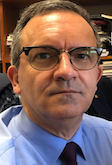


Prof. Rogerio Gaspar
Rogério Gaspar (RG) is a Full Professor at the Faculty of Pharmacy at the University of Lisboa (FFUL), previously the Vice-Rector/Pro-Rector for Research, Entrepreneurship and Knowledge Transfer at the University of Lisboa, ULisboa (July 2013 – September 2016 and October 2016 – September 2017) and currently the President of the Portuguese Society of Pharmaceutical Sciences (SPCF). Since 2017 he is a foreign member of the Royal Academy of Pharmacy (RANF, Spain). He also represents FFUL at the coordination of OPSS (Portuguese Observatory for Health Systems).
At the University of Lisbon (where he moved after being at the University of Coimbra from 1985 to 2006) he was the coordinator for the Pharmaceutical Technology sector (2007-2011 and 2011-2013), and also the coordinator (2007-2013) of the Nanomedicine & Drug Delivery Systems research group (Nano&DDS, ~60 researchers) within the Research Institute for Medicines and Pharmaceutical Sciences (iMed.UL) which he co-founded in 2007. Current research interests include the development of new therapeutic strategies using liposomes, polymeric biodegradable nanoparticles, and polymer therapeutics, with the main focus oriented towards cytosolic delivery of nucleic acids and use of targeted delivery systems for combination therapy or therapeutic vaccines in cancer.
He was also Sub-director FFUL / Vice-Dean FFUL (2012-2013), an elected member of the Scientific Council and Faculty Assembly of FFUL (2009-2013 and 2018-2022) and was also a member of the General Council of the University of Lisbon (2008-2013). Since June 2015, RG integrates the Department of Social Pharmacy at FFUL and was elected its President in February 2017 and re-elected for the next 4 years in July 2018. From May 1st, 2017 he become a researcher at the Institute of Bioengineering and Biosciences (iBB) of the University of Lisbon.
After graduation as a pharmacist from the University of Coimbra (Portugal) in 1985, Rogério Gaspar obtained his PhD in Pharmaceutical Sciences from the Catholic University of Louvain (Belgium) in 1991, for his research on the development of bioerodible polymeric nanoparticles for delivery of anti-Leishmaniasis chemotherapy. On return to the University of Coimbra he started the Colloidal Drug Carriers Unit (1993) within the Centre for Neurosciences and Cell Biology at Coimbra (CNC). The main research interests where nanoparticle-macrophage interactions, imaging systems for MRI, nanoparticulate ocular drug delivery, brain delivery, cancer targeted therapeutics using stealth-targeted liposomes and cytosolic delivery of nucleic acids using different cationic or pH sensitive systems. At that moment he became involved in the development of European Research Networks for advanced training (e.g. initiator and first coordinator of the Galenos network, 1993-1996) and served as president of the Spanish-Portuguese Local Chapter of the Controlled Release Society (2002-2005).
Between 1995 to 2002, in parallel with his research activities in academia, he became involved as expert and member of the Portuguese medicines evaluation board (INFARMED; and from Jan 2000-July 2002 as Vice-Chairman of the Management Board at INFARMED). He also became involved with the European Medicines Agency (now EMA) where he served on several committees (incl. CPMP now CHMP), he was a member of the Management Board, and of expert groups of the European Council of Ministers and European Commission. He was the coordinator of the working group that concluded the approval at Council of Ministers level for the European Directive in Clinical Trials (2000) and participated in the initial steps of the mutual recognition between Japan and EU in the pharmaceutical sector (2002). Further positions as expert to INFARMED (2008-2011) and the newly formed Ad-hoc expert group in Nanomedicines to EMA (2009-2011) until 2011. He has also held posts as an external consultant with a role of coordination and overview on the research activities of the Portuguese pharmaceutical company Tecnimede (2002-2008), as a consultant to ASEAN countries in the context of a EU cooperation programme (2005-2006), and was a consultant/training advisor to a number of pharmaceutical companies including Cell Therapeutics Inc. (Seattle, USA), Fresenius (Bad Homburg, Germany), Zcube s.r.l. (Milano, Italy), TEVA (Israel) and Cellator (Vancouver, Canada). He was also member of the SAB of the EPSRC (UK) Platform in Nanomedicines (2007 and 2008), has been member of the EAB of EuroNanoMed-I and II (ERA-NET) (since 2009) and participated as a member of the SAB of the Spanish CIBBER-BBN (2010-2013). Since 2007 also participated as an external reviewer for research programmes in nanotechnology/nanomedicine /medicines research in Spain (Ministry of Industry, Inst. Carlos III), Norway (Norges forskningsråd), Austria (FWF) and South Africa (CSIR).
Rogério Gaspar was heavily involved in the elaboration and implementation of the European Science Foundation's (ESF) “Forward Look in Nanomedicine”, as Co-chair/chair of two ESF Nanomedicine Research Conferences in Sant Feliu (2006 and 2008), and Chair of the ESF Summer School Nanomedicine Lisbon (2009).

Participated as one the members of the expert-panel in the establishment of the “Pharmaceutical Sciences 2020” strategic roadmap of FIP (http://www.sciencedirect.com/science/article/pii/S0928098709002139 ) and contributed to the “NanoMed Round Table: a report on the nanomedicine economic, regulatory, ethical and social environment” (http://www.philosophie.tu-darmstadt.de/media/institut_fuer_philosophie/diesunddas/nordmann/nanomed.pdf ), part of a FP7 project looking at positioning Nanomedicine in Europe.
Rogério was elected (2009-2013; and again in 2016-2018 and 2019-2020) as a member of the Executive Committee of the European Federation for Pharmaceutical Sciences (EUFEPS) acting also as Vice-President of EUFEPS (2011-2012 and again from January 2019). In that capacity he previously coordinated its position paper (http://www.sciencedirect.com/science/article/pii/S092809871200382X) in Science Policy looking up at Horizon2020 for an European Medicines Research Agenda. From 2016, he has under his responsibilities at EUFEPS ExCo the topics in Science Policy, European Affairs and Regulatory Science, coordinating also the EUFEPS Network in Regulatory Science.